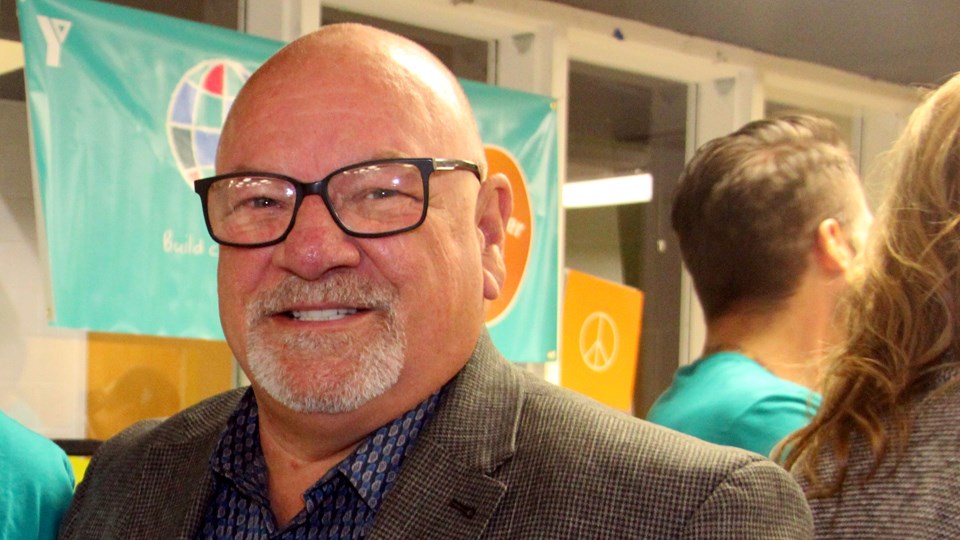The state of the city's downtown has been front and centre for Mayor Brian Bigger for nearly a month, following two stabbings, one of them fatal, in October.
In the wake of a violent month in the downtown core, Bigger established a task team to identify and close service gaps that have been impacting some of the city's most vulnerable citizens.
A number of those vulnerable citizens were removed from Memorial Park on Oct. 25 by city bylaw enforcement, with the assistance of Greater Sudbury Police.
"Those individuals who had been living in the park were offered, and continue to be offered opportunities for support and resources from community outreach," said Bigger. "It's my understanding that our outreach services had been there from the start, trying to provide ongoing and additional help and we have a number of outreach organizations in the community that are still out there connecting with those that wish to obtain assistance."
The mayor explained that there were some concerns raised regarding the people who were living in the park, but stood by his stance that removing people from an area is more about offering support than it is about enforcement.
"I don't believe this is a police matter; it's about trying to help out people with mental health, addictions, homelessness challenges and people are obviously in crisis in the downtown," said Bigger. "We have been working with all of our support organizations that work across the community and there are quite a number of them."
Support services and getting help for those living in challenging conditions was top of mind when the mayor spoke with Sudbury.com last week, though he did note that increased security measures are being looked at for the downtown.
"We've contacted a security outfit that we work with and we've provided additional resources on that end of Cedar Street," said Bigger.
A seven-month pilot project costing $275,000 was slated to start back in April, where an additional two bylaw officers would be added to the downtown ranks. The bylaw officers could provide backup to security guards facing difficulties or be deployed in areas “where uniformed security is not part of the service delivery.” They would work 16 hours a day beginning at 8:30 a.m. and be supplemented by part-time staff.
"Council has provided funding to support additional resources and so what changed was as they were about to be implemented and COVID hit and our number or people going through our transit stations and using our transit service dropped by about 60 per cent so we already had security in the downtown transit terminal," said Bigger.
"However we've seen an increase in the amount of transit usage and an amplified challenge throughout COVID here so staff was directed to provide additional resources and we're in the process of actually hiring two additional security guards."
When it comes to the task team Bigger struck to address issues downtown, the mayor shed some light on how the group will function, explaining that they will be meeting as often as bi-weekly, though the name "task team" may be a bit confusing to some as in its current state it is more focused on a collaborative sharing of ideas than it is on completing tasks.
"Most of these organizations have their own funding and their own support services and programs so it's not an authorization to do things, it's a collaborative effort in sharing information so that we're being as effective as we can in identifying solutions and opportunities to help the people in the downtown as well as the businesses," said Bigger.
On the city's end, where they hold the authority to implement changes and make safety improvements where needed, Bigger says that he's asked staff to accelerate the exchange of lights in the downtown, making a switch to LED lights on a number of light standards throughout the core.
"We've assigned city crews to do a significant amount of clean up, cleaning garbage out of the alleyways, (and) we have city crews throughout the downtown cleaning up garbage. We're increasing the overall presence of city workers in the downtown," said Bigger.
"A number of business owners have seen an increase in the amount of graffiti, so the city has contacted owners who have graffiti on their buildings and we're cleaning the graffiti on their behalf. It's probably not their No 1 priority at this time, but it's kind of a broken window syndrome that we're trying to address here."
‘Broken windows theory” is the now discredited idea that graffiti, panhandling and broken windows in neighbourhoods leads people to commit more crimes.
Bigger expects that the entire LED light conversion should be completed by the end of November.
In summarizing the work of the task team and the efforts to rehabilitate the city's downtown, Bigger says that there needs to be a level of trust between those in need and those who are looking to help.
"It's their choice and their decision not to accept services," said Bigger. "There's an element of trust and perhaps a long history of challenges that they've seen in their lives so that trust doesn't happen overnight, and you can't force somebody to accept help or support. These are individuals, they have families and people who love and care for them, and we're trying to do what's best for everybody."
